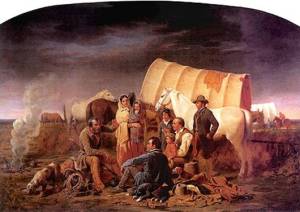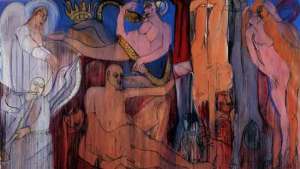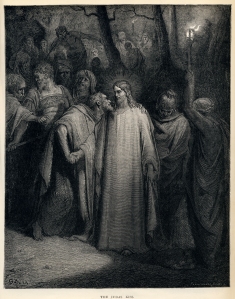Category Archives: Thoughts on God
Sacrament Meeting Talk: Pioneers
Today, I gave a talk in Sacrament Meeting for Pioneer Day. Here is the text…
The False Self
Over the past few months, there’s an idea I’ve been trying to articulate. It’s the idea of “becoming Real” — that, somehow, embracing “who we really are” is critical to being happy and healthy, and that it is God’s love that facilitates this. I’ve written about it in one form or another here, here, here, and here.
I finally got some clarity on it a week or so ago. During my 12-hour drive to our new city, I listened to portions of a book called Wild at Heart by John Eldredge. Oddly enough, it’s a book about masculinity (why I’m reading it is a long but unrelated story), but there is a section that resonated with me as profoundly universal for both men and women.
The concept is basically this…
Radical Freedom, Radical Grace Part 3: Freedom in Christ
In C.S. Lewis’s The Great Divorce, there is imagery that haunts me.
The damned arrive via bus at a meadow on the outskirts of Heaven. They are ghostlike, translucent, fading away. But Heaven is Real — blindingly, agonizingly so. The grass feels like knives. The stream like sharp shards of glass. The flowers are too heavy to lift.
It is unbearable for most of the damned. They return back to hell. They cannot face what is True. And so they are held captive in a prison of their own making.
Jesus said: “The Truth will set you free.” But I don’t believe that the Truth of which He spoke has much at all to do with complex theological systems or abstract authority claims, as we tend to assume in modernity. Instead, the Truth of which he spoke is much simpler…and much more robust.
It is Him.
He is the Way and the Truth and the Life. He is what sets us free.
How?
He allows us to be who we are.
We are human beings made in the image of God. This means that, fundamentally, “who we are” are creatures built to love as He loves (and He is love). In other words, we have the capacity to be so filled with the Love of God that we melt into Him; we become One with Him. This is the essence of the Great Intercessory Prayer of John 17. This is what He meant when He said that Life Eternal is to know God and Christ. He didn’t mean some rudimentary head-knowledge of God’s characteristics. He meant an experiential, Holy Union, the way we know our most cherished loved ones; a relationship between God and us and the people around us.
Yet so often, we choose not to be who we are. We choose to be who we think we should be. We choose to be who we think others want us to be. We put pressure on people around us to do the same. We pile on layers of deceit and shame, anger and judgment, lust and vice, fear and control. We think we’re doing right, but every layer takes us further and further from Truth, from Him, until we’re wasting away like the ghosts in The Great Divorce.
But here is the miracle of it all: we can be who we are just the way we are. We can choose Him this instant, whatever our circumstances, and He will set us free.
What does it look like?
Freedom in Christ means seeing our best qualities without boasting and our worst qualities without shame. It means seeing others’ best qualities without envy and their worst qualities without judgment. It is being able to change and repent without fear or hesitation, because even when we make mistakes, we know our worth. It is forgiving others before they apologize (or if they never do), because even when they make mistakes, we know their worth.
Freedom in Christ means embracing folks who are as flawed and floundering and foolish as we are (though perhaps in different ways) with the same open arms we’ve found in our union with Him. It is letting those around us be free to experience their own transformations in their own way, trusting that God will do as well by them as He has by us. It is knowing that whatever happens, however painful, He will use it for our good, for we are in Him and He in us.
Freedom in Christ means being transformed so that when He appears we shall be like Him. It is knowing Him even as we are known. It is being who we are — who we really, truly are — and knowing it is Enough.
Thoughts for Good Friday
Today, the Christian world commemorates the crucifixion of Jesus. As Mormons, we don’t have much of a Good Friday tradition, but I like to think about it when it comes around. It’s a lovely reminder of what is most important.
The blood spilled in Gethsemane reminds me of the sorrow of this world. May I remember the holy purpose of suffering. May I swallow my own Bitter Cup. May I remember that the trials and turmoil of mortality make me more fit for the Kingdom of God.

The betrayal in the Garden reminds me of my own temptations to sell the Master for recognition or anger or jealousy or greed. May Christ be the only God I worship. May I be ever loyal to Him.
The humiliation of the Cross reminds me of the price of sin. He was lifted up as a symbol of the pain we inflict on each other. He was lifted up to remind us that when we hurt, so does He. He was lifted up to draw us unto Him. May I heed His invitation. May I kneel at the foot of the Cross.

The burial in the Tomb reminds me that all that is corrupt must vanish. May I bury my own Natural Man. May I lay it to rest with Him.
Good Friday is the furnace of the Lord’s affliction. It is a reminder that we all must walk through sorrow on our way to Resurrection Morning.
Radical Freedom, Radical Grace Part 2: That Weak Things May Become Strong
In my last post, I introduced an idea that is fundamental to the way I make sense of this world: a perspective of radical freedom and radical grace.
Today, I want to explore another implication of this approach: the value of weakness.
In our fast-paced, modern world — and, let’s face it, our self-reliant Mormon culture — there is a sense that weakness and vulnerability are signs of inferiority. That when we struggle, it is because we are doing something “wrong”; or, perhaps, not doing enough things “right.”
And sure enough, with the radical freedom we possess, we create much of our own misery with our choices. That’s part of the purpose of this life, after all; to learn by our experience to determine good from evil.
But not all struggle is “choice”-related. Some of it is the inherent frailty of the flesh. We might say that Nature is as Radically Free as we are, and that it evolves all kinds of problems, such as illness, appetite, brutality, and disaster. For all its stunning beauty, the natural world is also viciously cruel: we have no power against a tsunami, for example. We are polarized beings in a polarized world, with sparks of divinity competing against base, fleshly instincts and natural processes that can destroy us in an instant.
Of course, we would not be free otherwise. Without both extremes, it would be like living in the Truman Show or the Hunger Games, with everything, even the weather, perfectly controlled. There are some who view God this way, as Master Game Maker, but not me. I believe that uncertainty, disease, and corruption are the price we pay for freedom. And that it’s worth it.
The question is what we do with it.
Radical Freedom, Radical Grace — Part 1
This is a post that’s been brewing for a really long time. I’ve got bits and pieces written in fragment after fragment in my drafts folder. It’s a big topic. It’s an important one. At the expense of sounding melodramatic, it pretty much sums up my entire philosophy for living on this planet with other people.
It’s too big a topic to cover comprehensively in a format like this, but I figured I’d at least try to articulate some of the most important philosophical underpinnings. Then I’ll follow it up with a post on how this approach affects the way I interact with people. For the record, this is a faith-based perspective that is deeply informed by my Mormon beliefs and my own experiences with God.
Quite simply, it goes like this: I believe in a world of radical freedom and radical grace.
Here’s why…
Read the rest of this entry
Some Thoughts on the Psalm of Nephi
In Sunday School this week, we’re studying the Psalm of Nephi (2 Nephi 4:17-35).
I LOVE the Psalm of Nephi. It’s one of my favorite passages in the Book of Mormon. It reminds me of how trustworthy and merciful God is, and how frail I am without Him. But I haven’t always felt this way. For a time, it was a baffling bit of scripture. I struggled to fit it into a worldview that left little room for mistakes.
Gifts OCD Has Given Me
This is the 100th post on my blog! Celebration time!!!!! 🙂
Since it’s my hundredth post, and it’s coming up on the New Year, I thought it might be a nice opportunity for reflection. So I went through some of the old posts I’d written. WOW. What a transformative few years it’s been since I started writing my blog in June 2008.
In some ways, it’s painful to read. In other ways, it’s miraculous. I read between the lines and remember what this journey has been. In particular, it’s striking to revisit the agonizing confusion that came with my fight against OCD, especially before I knew I had OCD (I wasn’t diagnosed until December 2010, but I have been battling it my whole life). I see it in every post, every question. And yet, I would not change any of it. OCD has been my life’s greatest trial; but as is often the case with great trials, it has also provided many of my greatest gifts.
Today, I’d like to share some of the gifts OCD has given me — graces I would not have received were it not for my day-to-day struggle to live a rich, meaningful life despite my disorder. I write this for the benefit of others struggling with difficult trials of every variety (including myself!), but with a special place in my heart for those facing mental illness. I hope this will be a reminder that there is meaning in our battle, that God can create tremendous beauty from even the deepest despair, that there is hope for all of us.
LDS Christmas Talk: Behold, the Condescension of God
I gave a talk at our ward Christmas party this evening, which I called “Behold, the Condescension of God.” Thought I’d share it here…
Empathy and the Suffering God
My sister posted this video today on Facebook. It is really interesting — well worth the 10 minutes you’ll spend on it.
One thought. The narrator here argues that there is no empathy in heaven, for in heaven there is no suffering. I’m not so sure. See Moses 7, the Beatitudes, or think of Christ’s agony in Gethsemane and on the cross. I believe that if the scriptures teach anything, it is that our God is a God who suffers.
God is love, the scriptures teach. And as anyone who has loved can attest, that does not come without sorrow.









